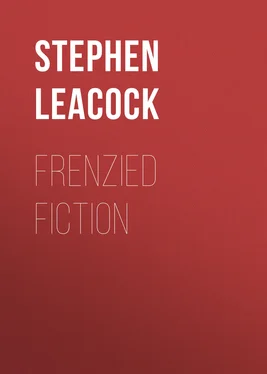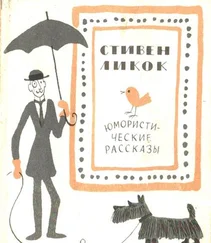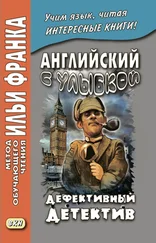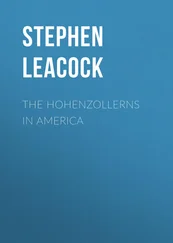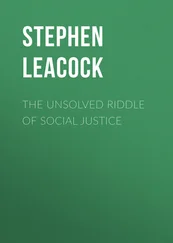Stephen Leacock - Frenzied Fiction
Здесь есть возможность читать онлайн «Stephen Leacock - Frenzied Fiction» — ознакомительный отрывок электронной книги совершенно бесплатно, а после прочтения отрывка купить полную версию. В некоторых случаях можно слушать аудио, скачать через торрент в формате fb2 и присутствует краткое содержание. Жанр: foreign_humor, Юмористические книги, foreign_antique, на английском языке. Описание произведения, (предисловие) а так же отзывы посетителей доступны на портале библиотеки ЛибКат.
- Название:Frenzied Fiction
- Автор:
- Жанр:
- Год:неизвестен
- ISBN:нет данных
- Рейтинг книги:4 / 5. Голосов: 1
-
Избранное:Добавить в избранное
- Отзывы:
-
Ваша оценка:
- 80
- 1
- 2
- 3
- 4
- 5
Frenzied Fiction: краткое содержание, описание и аннотация
Предлагаем к чтению аннотацию, описание, краткое содержание или предисловие (зависит от того, что написал сам автор книги «Frenzied Fiction»). Если вы не нашли необходимую информацию о книге — напишите в комментариях, мы постараемся отыскать её.
Frenzied Fiction — читать онлайн ознакомительный отрывок
Ниже представлен текст книги, разбитый по страницам. Система сохранения места последней прочитанной страницы, позволяет с удобством читать онлайн бесплатно книгу «Frenzied Fiction», без необходимости каждый раз заново искать на чём Вы остановились. Поставьте закладку, и сможете в любой момент перейти на страницу, на которой закончили чтение.
Интервал:
Закладка:
Stephen Leacock
Frenzied Fiction
I. My Revelations as a Spy
In many people the very name “Spy” excites a shudder of apprehension; we Spies, in fact, get quite used to being shuddered at. None of us Spies mind it at all. Whenever I enter a hotel and register myself as a Spy I am quite accustomed to see a thrill of fear run round the clerks, or clerk, behind the desk.
Us Spies or We Spies—for we call ourselves both—are thus a race apart. None know us. All fear us. Where do we live? Nowhere. Where are we? Everywhere. Frequently we don’t know ourselves where we are. The secret orders that we receive come from so high up that it is often forbidden to us even to ask where we are. A friend of mine, or at least a Fellow Spy—us Spies have no friends—one of the most brilliant men in the Hungarian Secret Service, once spent a month in New York under the impression that he was in Winnipeg. If this happened to the most brilliant, think of the others.
All, I say, fear us. Because they know and have reason to know our power. Hence, in spite of the prejudice against us, we are able to move everywhere, to lodge in the best hotels, and enter any society that we wish to penetrate.
Let me relate an incident to illustrate this: a month ago I entered one of the largest of the New York hotels which I will merely call the B. hotel without naming it: to do so might blast it. We Spies, in fact, never name a hotel. At the most we indicate it by a number known only to ourselves, such as 1, 2, or 3.
On my presenting myself at the desk the clerk informed me that he had no room vacant. I knew this of course to be a mere subterfuge; whether or not he suspected that I was a Spy I cannot say. I was muffled up, to avoid recognition, in a long overcoat with the collar turned up and reaching well above my ears, while the black beard and the moustache, that I had slipped on in entering the hotel, concealed my face. “Let me speak a moment to the manager,” I said. When he came I beckoned him aside and taking his ear in my hand I breathed two words into it. “Good heavens!” he gasped, while his face turned as pale as ashes. “Is it enough?” I asked. “Can I have a room, or must I breathe again?” “No, no,” said the manager, still trembling. Then, turning to the clerk: “Give this gentleman a room,” he said, “and give him a bath.”
What these two words are that will get a room in New York at once I must not divulge. Even now, when the veil of secrecy is being lifted, the international interests involved are too complicated to permit it. Suffice it to say that if these two had failed I know a couple of others still better.
I narrate this incident, otherwise trivial, as indicating the astounding ramifications and the ubiquity of the international spy system. A similar illustration occurs to me as I write. I was walking the other day with another man, on upper B. way between the T. Building and the W. Garden.
“Do you see that man over there?” I said, pointing from the side of the street on which we were walking on the sidewalk to the other side opposite to the side that we were on.
“The man with the straw hat?” he asked. “Yes, what of him?”
“Oh, nothing,” I answered, “except that he’s a Spy!”
“Great heavens!” exclaimed my acquaintance, leaning up against a lamp-post for support. “A Spy! How do you know that? What does it mean?”
I gave a quiet laugh—we Spies learn to laugh very quietly.
“Ha!” I said, “that is my secret, my friend. Verbum sapientius! Che sara sara! Yodel doodle doo! ”
My acquaintance fell in a dead faint upon the street. I watched them take him away in an ambulance. Will the reader be surprised to learn that among the white-coated attendants who removed him I recognized no less a person than the famous Russian Spy, Poulispantzoff. What he was doing there I could not tell. No doubt his orders came from so high up that he himself did not know. I had seen him only twice before—once when we were both disguised as Zulus at Buluwayo, and once in the interior of China, at the time when Poulispantzoff made his secret entry into Thibet concealed in a tea-case. He was inside the tea-case when I saw him; so at least I was informed by the coolies who carried it. Yet I recognized him instantly. Neither he nor I, however, gave any sign of recognition other than an imperceptible movement of the outer eyelid. (We Spies learn to move the outer lid of the eye so imperceptibly that it cannot be seen.) Yet after meeting Poulispantzoff in this way I was not surprised to read in the evening papers a few hours afterward that the uncle of the young King of Siam had been assassinated. The connection between these two events I am unfortunately not at liberty to explain; the consequences to the Vatican would be too serious. I doubt if it could remain top-side up.
These, however, are but passing incidents in a life filled with danger and excitement. They would have remained unrecorded and unrevealed, like the rest of my revelations, were it not that certain recent events have to some extent removed the seal of secrecy from my lips. The death of a certain royal sovereign makes it possible for me to divulge things hitherto undivulgeable. Even now I can only tell a part, a small part, of the terrific things that I know. When more sovereigns die I can divulge more. I hope to keep on divulging at intervals for years. But I am compelled to be cautious. My relations with the Wilhelmstrasse, with Downing Street and the Quai d’Orsay, are so intimate, and my footing with the Yildiz Kiosk and the Waldorf-Astoria and Childs’ Restaurants are so delicate, that a single faux pas might prove to be a false step.
It is now seventeen years since I entered the Secret Service of the G. empire. During this time my activities have taken me into every quarter of the globe, at times even into every eighth or sixteenth of it.
It was I who first brought back word to the Imperial Chancellor of the existence of an Entente between England and France. “Is there an Entente?” he asked me, trembling with excitement, on my arrival at the Wilhelmstrasse. “Your Excellency,” I said, “there is.” He groaned. “Can you stop it?” he asked. “Don’t ask me,” I said sadly. “Where must we strike?” demanded the Chancellor. “Fetch me a map,” I said. They did so. I placed my finger on the map. “Quick, quick,” said the Chancellor, “look where his finger is.” They lifted it up. “Morocco!” they cried. I had meant it for Abyssinia but it was too late to change. That night the warship Panther sailed under sealed orders. The rest is history, or at least history and geography.
In the same way it was I who brought word to the Wilhelmstrasse of the rapprochement between England and Russia in Persia. “What did you find?” asked the Chancellor as I laid aside the Russian disguise in which I had travelled. “A Rapprochement! ” I said. He groaned. “They seem to get all the best words,” he said.
I shall always feel, to my regret; that I am personally responsible for the outbreak of the present war. It may have had ulterior causes. But there is no doubt that it was precipitated by the fact that, for the first time in seventeen years, I took a six weeks’ vacation in June and July of 1914. The consequences of this careless step I ought to have foreseen. Yet I took such precautions as I could. “Do you think,” I asked, “that you can preserve the status quo for six weeks, merely six weeks, if I stop spying and take a rest?” “We’ll try,” they answered. “Remember,” I said, as I packed my things, “keep the Dardanelles closed; have the Sandjak of Novi Bazaar properly patrolled, and let the Dobrudja remain under a modus vivendi till I come back.”
Читать дальшеИнтервал:
Закладка:
Похожие книги на «Frenzied Fiction»
Представляем Вашему вниманию похожие книги на «Frenzied Fiction» списком для выбора. Мы отобрали схожую по названию и смыслу литературу в надежде предоставить читателям больше вариантов отыскать новые, интересные, ещё непрочитанные произведения.
Обсуждение, отзывы о книге «Frenzied Fiction» и просто собственные мнения читателей. Оставьте ваши комментарии, напишите, что Вы думаете о произведении, его смысле или главных героях. Укажите что конкретно понравилось, а что нет, и почему Вы так считаете.
